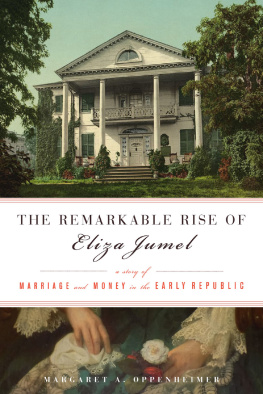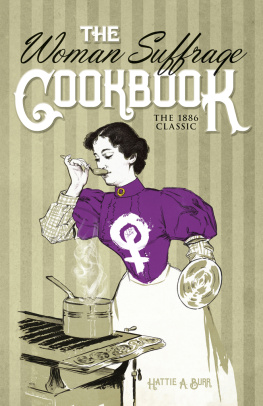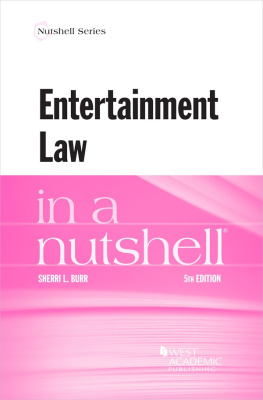BORN BETSY BOWEN into grinding poverty, the woman who reinvented herself as Eliza Jumel was raised in a brothel, indentured as a servant, and confined to a workhouse when her mother was in jail. Seizing opportunities and readjusting facts to achieve the security and status she so desperately craved, she obtained a fortune from her first husband, a French merchant, and nearly lost it to her second, the notorious vice president Aaron Burr. Divorcing Burr promptly amid lurid charges of adultery, she lived on triumphantly to the age of ninety, astutely managing her property and public persona.
By the end of her life, Madame Jumel was one of New Yorks richest women, with servants of her own, an art collection, an elegant mansion, a summer home in Saratoga Springs, and several hundred acres of land. After her death, a titanic battle over her estate went all the way to the United States Supreme Court twice.
As the feud over her fortune riveted the nation, family members told of a woman who earned the gratitude of Napoleon I and shone at the courts of Louis XVIII and Charles X. Their opponents painted a different picture, of a prostitute who bore George Washingtons illegitimate son, a wife who defrauded her husband and perhaps even plotted his death. Now Eliza Jumels real storyso unique that it surpasses any inventionhas finally been told.

Copyright 2016 by Margaret A. Oppenheimer
All rights reserved
First edition
Published by Chicago Review Press Incorporated
814 North Franklin Street
Chicago, Illinois 60610
ISBN 978-1-61373-380-6
Library of Congress Cataloging-in-Publication Data
Oppenheimer, Margaret A.
The remarkable rise of Eliza Jumel : a story of marriage and money in the early republic / Margaret A. Oppenheimer.
pages cm
Includes index.
ISBN 978-1-61373-380-6 (hardback)
1. Jumel, Eliza Bowen, 1775?-1865. 2. Jumel, Stephen, 1755-1832. 3. Married womenNew York (State)New YorkBiography. 4. French AmericansNew York (State)Biography. 5. Burr, Aaron, 1756-1836. 6. Politicians spousesUnited StatesBiography. 7. SocialitesNew York (State)New YorkBiography. 8. BusinesswomenNew York (State)New YorkBiography. 9. Jumel, Eliza Bowen, 1775?-1865Family. 10. New York (N.Y.)History1775-1865Biography. I. Title.
E302.6.B91O66 2015
973.46092dc23
[B]
2015029634
Interior design: Jonathan Hahn
Printed in the United States of America
5 4 3 2 1

For my parents, with love.

CONTENTS


Index
PROLOGUE
I n 1873 New Yorkers following the courtroom battle of the decade could read a short update in the Commercial Advertiser:
It may be gratifying to the relatives and friends of the luckless jurors engaged in the trial of the JUMEL will case, to know that that company of wretched men still existsnot healthy nor happy, but alive and patient. It is altogether impossible to say when the fight for the estate will end; but it is to be presumed that the jurors profited by the hint they received, and by settling up all their worldly affairs, prepared themselves for a gradual and peaceful descent into the tomb. Court, counsel, and jury are becoming old and gray.
The fight over the Jumel fortune began in 1865, after Eliza Jumel died in her ninetieth year. It raged on into the 1890s. As the years passed, Americans from Maine to California marveled at the stories woven around the amazing Madame Jumel, who rose from grinding poverty to enviable wealth. Family members told of a woman who earned the gratitude of Napoleon I, shone at the courts of Louis XVIII and Charles X, and fought valiantly to recoup her first
Which narrative should we believe today? Over the course of Elizas tumultuous afterlife as the star of a courtroom drama, the facts of her life were obscured beneath libels and legends. Her real storyso strikingly unique that it surpasses any inventionhas yet to be told.
The child called Betsy Bowen, who became Eliza Jumel and later Mrs. Aaron Burr, was raised in a brothel, indentured as a servant, and confined to a workhouse when her mother was in jail. Yet by the end of her life she had servants of her own, a New York mansion that stands today, a summer home in Saratoga Springs that survives as well, and several hundred acres of land. She was Americas first major woman art collector, forming a collection of 242 European paintings. She raised a niece, great-niece, and great-nephew to adulthood and arranged good marriages for both the girls. She married twice herself, above her station, without family connections to ease the way. She used marriages and money to improve her social standing and the legal system to protect her financial security. When she died, her estate was worth some $1 million dollars, comparable in buying power to $15 million today. She even managed to do what Alexander Hamilton could not: she triumphed over Aaron Burr.
Her life represented an extreme rarity for her era: a rags-to-riches story, female version. One of the foundational beliefs of America was that a boy who grew up poor could work his way up to fame and fortune.
But there was no comparable myth for young women. Working hard didnt translate into opportunities for girls, because the available jobs paid badly and afforded little or no upward mobility.nearly as impoverished as the girls themselves. It took a woman like Eliza to break the mold. Intelligent, determined, sometimes difficult, she had the strength to seize opportunities and readjust facts to achieve the security and status she so desperately craved.
To understand her unique achievement, we must begin in Providence, Rhode Island, with the young girl who was known as Betsy Bowen. Watch vigilantly as she steps onto historys stage, because the echoes of a riot blur the sound of her voice.

1

BEGINNINGS
M ost nights Betsy would have heard the buzz of voices rising from the rooms below. Occasionally men might shout a toast or bellow a bawdy song. But the bursts of noise, the clinking mugs and rattling dice, would have been the normal backdrop of her life.
She might have half awakened once or twice to the sound of footsteps on the stairs. There would be a man stumbling with drink, and a woman, giggling and whispering to himEsther perhaps, or Debby or Black Bets, or even Betsys mother, Phebe. But then she could turn over and go back to sleep.
The night of July 22, 1782, would have been terrifyingly different.
The cause of the riot in Providence is unknown. But the city had changed dramatically since the outbreak of the American Revolution in ways that must have upset long-term residents. On the face of it, Providence was still a pastoral place, looking much as a clergyman had found it in 1754, with two streets of painted houses on the northeast side of the Providence River, surmounted by a most delightful hill, gradually ascending to a great distance, all cut into gardens, orchards, pleasant fields, and beautiful enclosures.
Already a magnet for transients, the growing city attracted yet more.
The four were pushed out, but the women who replaced them followed the same profession.
Next page











 1
1 